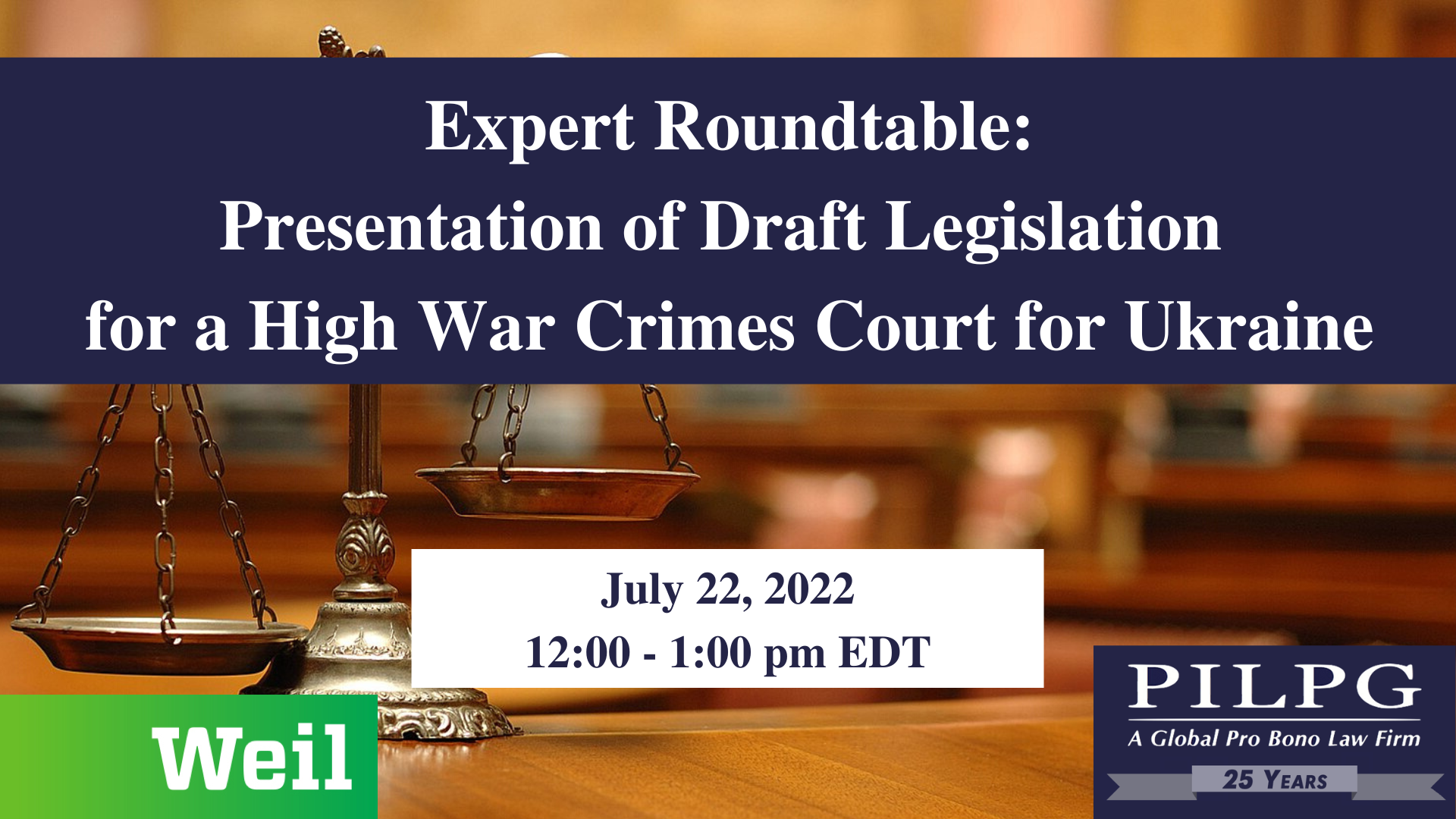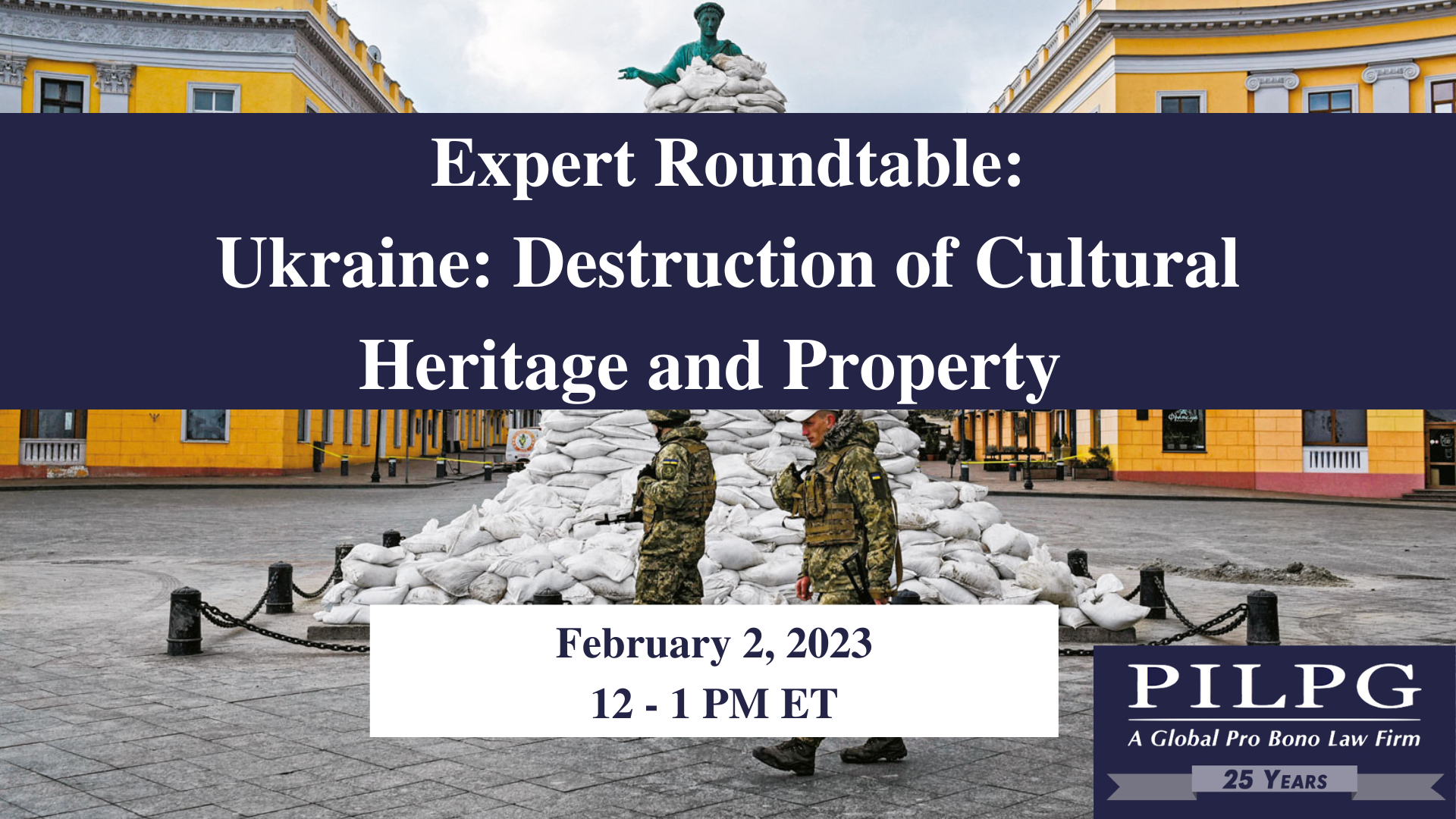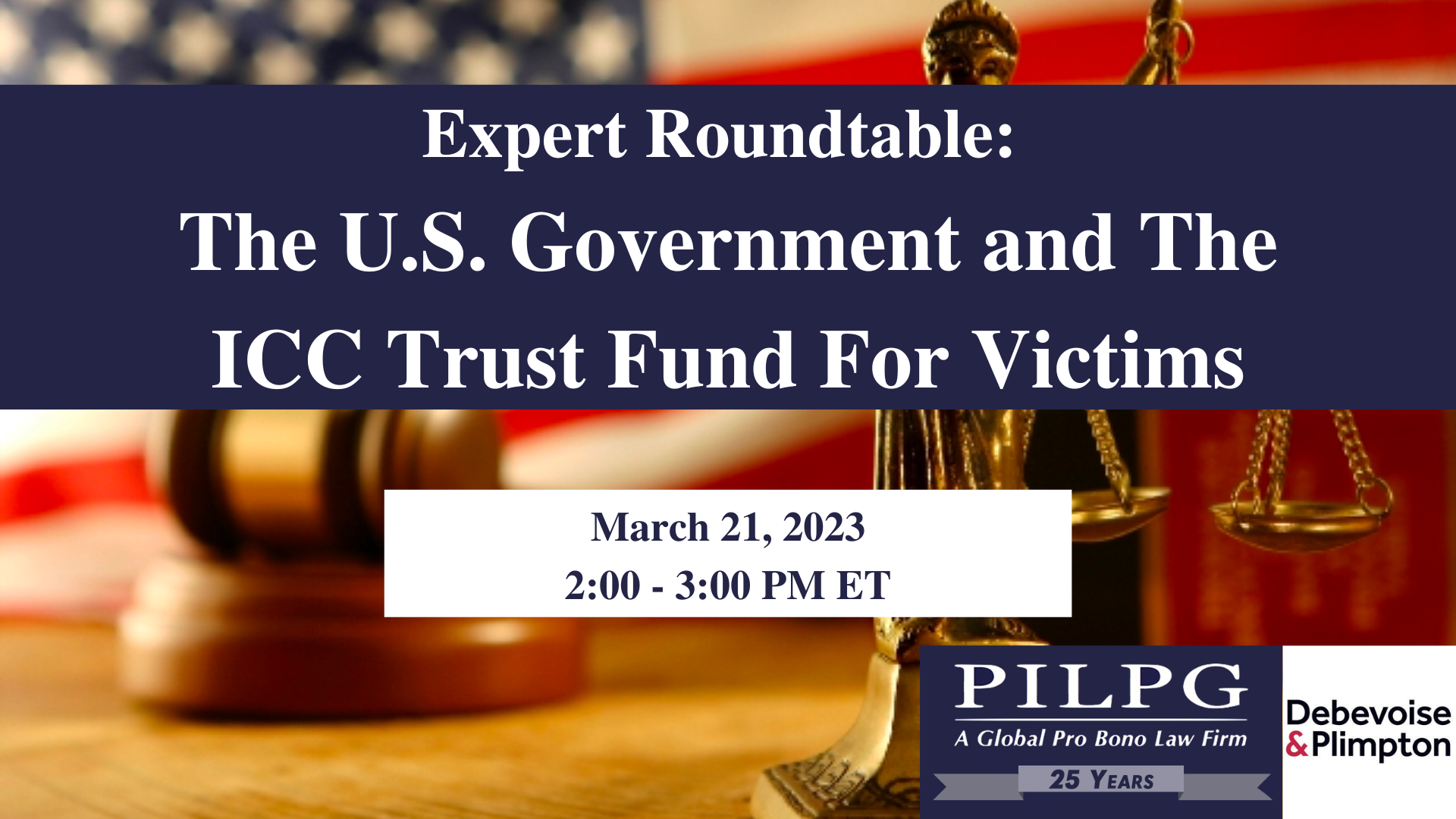The Role of International Law in the Ukraine-Russia Conflict
During this event, PILPG experts—Dr. Yvonne Dutton, Dr. Margaret deGuzman, Ambassador Stephen Rapp, and Professor Jennifer Trahan—discussed the recent developments between Russia and Ukraine, the role of international law in this situation, and why it is still important to talk about concepts such as sovereignty, territorial integrity, the crime of aggression, and the use of force. The event was moderated by PILPG Managing Director Professor Milena Sterio.
The Future of the Peace Process in Ukraine
During this event our panelists discussed the recent developments between Russia and Ukraine, talk through potential legal and policy options for peace moving forward, and provided their perspectives on the essential elements needed to negotiate peace in Ukraine. This event was moderated by PILPG Managing Director Professor Milena Sterio.
The War in Ukraine and the Role of the United Nations
During this event, co-sponsored by Weil, our panelists discussed recent developments surrounding the war in Ukraine, provided insights to some of the most pressing legal questions regarding the role of the various United Nations bodies in addressing the Russian invasion of Ukraine, and provided background to the other international mechanisms charged with maintaining global peace, security, and justice. This event was moderated by PILPG Senior Legal Advisor Dr. Yvonne Dutton.
Putin: Pathways to Prosecution
During this event, our distinguished panel of former international prosecutors and diplomats discussed recent developments in Putin’s war in Ukraine, evaluated legal bases for Vladimir Putin’s possible indictment for atrocity crimes, and explored the implications of such an indictment on future peace negotiations. This event was moderated by PILPG President Dr. Paul Williams.
Reparations in Ukraine
During this event our panelists discussed Russia’s financial responsibility for damages, the role reparations may have in post-conflict reconstruction, including what a victim-centered approach to reparations may look like, and the international support needed to hold Russia accountable for damages inflicted since its invasion. This event was moderated by PILPG Senior Legal Advisor Dr. Yvonne Dutton.
Presentation of Draft Legislation for a High War Crimes Court for Ukraine
To facilitate fair and effective accountability for the atrocity crimes committed in Ukraine, PILPG, together with Weil Gotshal & Manges and in consultations with stakeholders in Ukraine, prepared draft legislation for a High War Crimes Court for Ukraine to prosecute atrocity crimes. The legislation is modeled after the High Anti-Corruption Court for Ukraine that was established in 2019 and best practices of internationalized domestic war crimes courts around the globe. The legislation has been revised during a series of workshops with international and Ukrainian experts. This event was the first public presentation of the draft legislation. During the session, the experts and drafters of the legislation discussed the need to establish such a court and provide an overview of the essential provisions of the legislation. This event was moderated by PILPG Founder Dr. Paul R. Williams.
Russia Referendum in Donbas and Reintegration of Donbas and Crimea into Ukraine
During this event, our panelists, Anna Ovdiienko, Ievgenii Iaroshenko, Timothy Waters, and Mandy Cheung, discussed the legal issues surrounding the Russian intention to hold a referendum on the Ukrainian region of Donbas and its subsequent annexation, as well as the legal status of Donbas and Crimea, and their full reintegration into Ukraine. This event was moderated by PILPG Founder Paul Williams.
Lessons From Ukraine: War and Global Food Security
During this event, our panelists discussed the impact of Russia's war on global food security, lessons the international community should take away from the crisis, and concrete policy considerations to examine in order to reduce global food insecurity moving forward. This event was moderated by PILPG Managing Director Milena Sterio.
51st Session of the United Nations Human Rights Council Virtual side event: Examining Options for Accountability in Ukraine
The event was organized in partnership with the Permanent Mission of Ukraine in Geneva and co-sponsored by 42 members of the Group of Friends of Accountability following the aggression against Ukraine. It featured contributions by the Independent International Commission of Inquiry for Ukraine, high-level officials from Ukraine, and prominent experts in the field of international law. The speakers discussed the means of ensuring accountability for violations and crimes committed in the context of Russian aggression against Ukraine.
Exploring International Humanitarian Law and its Application During the Russian War in Ukraine
PILPG Executive Director, Dr. Greg Noone delivered the first lecture in Center for Civil Liberties and Public International Law & Policy Group’s series of public lectures dedicated to IHL/LOAC (International humanitarian law/Law of Armed Conflict) studies.
Ukraine: Destruction of Cultural Heritage and Property
During this event our panelists provided background on the destruction of cultural heritage and property, both within international law more widely and in the Ukraine context specifically. Our panelists discussed the situation on the ground in Ukraine concerning the destruction of cultural property, Ukraine and international organizations’ ongoing efforts to catalog the damage, as well as the possibilities for prosecution and possible mechanisms for the return of stolen property. This event was moderated by PILPG Managing Director Milena Sterio.
The U.S. Government and The ICC Trust Fund For Victims
The roundtable presented the findings of a joint project between PILPG and Debevoise & Plimpton LLP exploring the historic relationship between the United States and the ICC, and the domestic legal regime which has historically constrained engagement with the court, and by extension, the Trust Fund. Franziska Ecklemans, the Executive Director of the Trust Fund for Victims, described the Trust Fund’s mandate and operations. Legal experts from Debevoise & Plimpton LLP and PILPG outlined the changing domestic legal regime which shapes the U.S. government’s relationship with the ICC (Just Security symposium). U.S. Ambassador-at-Large for Global Criminal Justice Beth Van Schaack discussed legal and political considerations involved in a decision by the U.S. government to contribute to the Trust Fund in support of victims in Ukraine and elsewhere. This expert roundtable was moderated by PILPG Managing Director Milena Sterio.
Prosecuting Putin: Next Steps
During the roundtable event, former Chief Prosecutor of the Special Court for Sierra Leone David Crane, former International Co-Prosecutor for the Extraordinary Chambers in the Courts of Cambodia Robert Petit, Co-Dean of the Case Western Reserve University School of Law Michael Scharf, and Professor Milena Sterio discussed the implications of this arrest warrant, how an ICC trial with Putin might proceed, and the consequences of a possible indictment of Putin for peace negotiations in Ukraine.
Killer Robots, Drones, AI, and the Future of Warfare
The US military has updated its Department of Defense directive to focus on the use of autonomous weapons, marking its first revision in a decade. The development follows the announcement by NATO in October 2022 of an implementation plan designed to maintain the alliance's technological lead. The increasing use of semi-autonomous missiles in Ukraine is creating pressure to use fully autonomous weapons on the battlefield. However, critics, including the Campaign to Stop Killer Robots, argue that autonomous weapons lack the judgment required to distinguish between civilians and legitimate military targets and that the risk of weapons being used by terrorists and other non-state actors is too high. For some time Lethal autonomous weapons have now been used on the battlefield. Ukraine is no exception. Both sides use drones for reconnaissance and conduct of hostilities. Dr. Greg Noone speaks about how these developments relate to various aspects of International Law.















